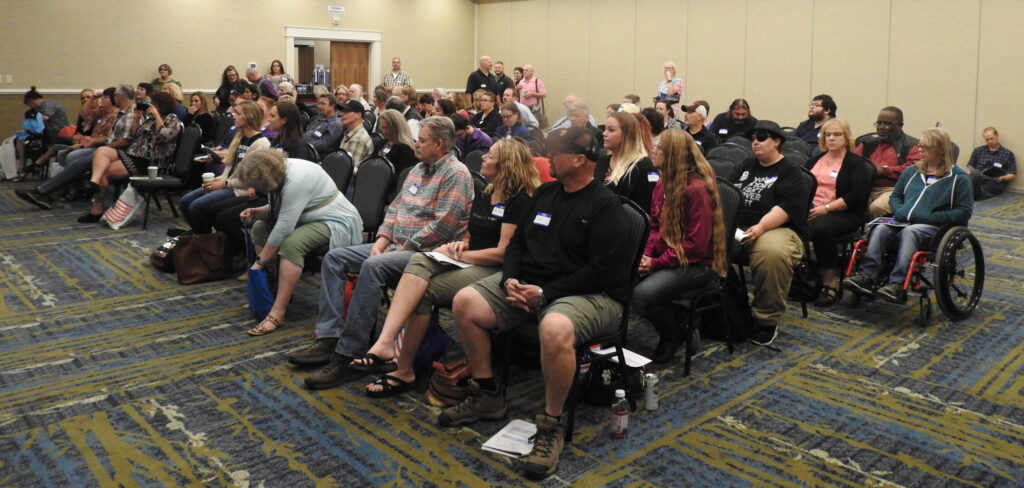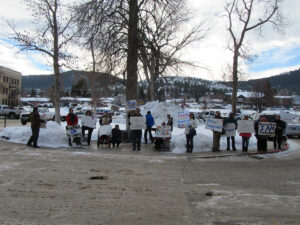We are a network of individuals who are on the path of recovery.
We identify as being in recovery from mental health, substance abuse and or addiction struggles. Together we share information, provide peer support, advocate with a united voice and improve the system. We come from places all across Montana, with different stories and experiences but together we make a difference. This is the Recovery Movement in Montana.



Art Heals bring you a monthly art project to support your recovery.
Advocacy
 Standing up for what we believe is right, having a voice, making choices in recovery, and sharing our own recovery story are some of the things that make up advocacy and self-advocacy.
Standing up for what we believe is right, having a voice, making choices in recovery, and sharing our own recovery story are some of the things that make up advocacy and self-advocacy.
Let’s start with self-advocacy which refers to an individual’s ability to effectively communicate, convey, negotiate, or assert his/her own interests, desires, needs, or rights. It involves making informed decisions and taking responsibility for those decisions (Van Reusen et al., 1994).
Knowing yourself and your strengths, needs, and interests is the first step toward advocating for your rights. Once we begin to find our way on the path of recovery, we may want to begin to advocate for ourselves with those around us—peer supporters, friends, family, service providers, and doctors. These conversations may be difficult, but having them is vital to your recovery. Remember, you are the expert on yourself.
It may be that prior to getting on the path to recovery, others were making decisions for you or acting in what they believed to be your best interest. Now may be the time for you to let others know what you believe to be in your best interest. You may find yourself in the process of taking control and making decisions affecting your life and perhaps others’ lives. This process of self-determination means making informed choices, problem solving, setting and attaining goals—essentially being a self-advocate.
Advocacy or advocating for others may be something you are interested in doing. Advocating for another person isn’t about acting in a person’s perceived best interest, but it is standing with a person to ensure they are able to articulate and obtain what they want or need. Perhaps you may consider speaking up and advocating for various changes in the services in your community.
Here are a few examples of advocacy:
- Speak to your legislature or a special committee.
- Get involved with an advocacy group or organization.
- Share your recovery story to support others in recovery.
- Whether advocating for yourself, for others, for your community, or as part of an organization, advocacy is very self-empowering. You can make a real difference in your life, the lives of others, and even the community.
- Reach out to Montana’s Peer Network and share your recovery story on one of our “Recovery Talks” podcasts.
Advancing Advocacy Blog
Native American Heritage Month
The arrival of Native American Heritage Month heralds a deeply personal journey for me, a Blackfoot woman steadfastly navigating the intricate path of recovery. Within the expansive tapestry of indigenous cultures, I discover not only solace and strength but a profound connection to my roots that serves as the cornerstone of my journey of self-discovery. Engaged in tribal liaison work with Montana tribes, this month transcends mere celebration; it stands as a testament to the transformative power of cultural heritage, weaving through my role as a mother and illuminating the unique lens of recovery from an American Indian woman’s perspective.
Elevating PSS through Career Development: A Pathway to Success
Peer Support Specialists play a crucial role in the behavioral health field, offering empathetic understanding and lived experience to those in need. While their dedication is commendable, it’s essential to recognize the immense value that career development can bring to their professional journey. Montana’s Peer Network continues to create opportunities for career development because we recognize the significance of investing in the growth and advancement of Peer Support Specialists, and how it not only benefits them personally but also contributes to the overall improvement of behavioral health services.
Realizing Recovery Blog
Managing Seasonal Change
Seasonal changes are an interesting topic for me to write about. Starting my recovery journey in the Great Northwest you would think that I would have lots to say about the topic. I remember while I was going through mental health treatment lots of my peers talked about how the seasonal changes really affected their mental health.
What Recovery Means to Me
The meaning of recovery to me has evolved over the years as I have evolved. I remember sitting in county jail thinking, “If I can just not get high, get a job somewhere doing anything, and an apartment, that will be enough for me.” My expectations of myself and what life could look like were low. Honestly, if I would have achieved only that, it still would have been recovery, it still would have been a significantly better life than when I was at my lowest.
The Art of Recovery
Recovery allows me to reframe the artwork that is my life. My addiction took that piece of artwork and buried it in the basement of my soul. Through the years, I piled boxes of trauma over the top of it, it gathered dust and lost all its value.
Recovery is Life
Recovery is the beginning of positive change and evolving into the spirit and human being an individual was meant to be. Its the bond and balance of body, mind, and soul. It is the discovery of who Creator really made an individual to be.
Relationships in Recovery
I believe that relationships are what gives each of our lives purpose. The connection that each of us have with the people in our lives is what gives us the ability have the emotions that we get to experience. I also believe that we get to have a relationship with ourselves.





